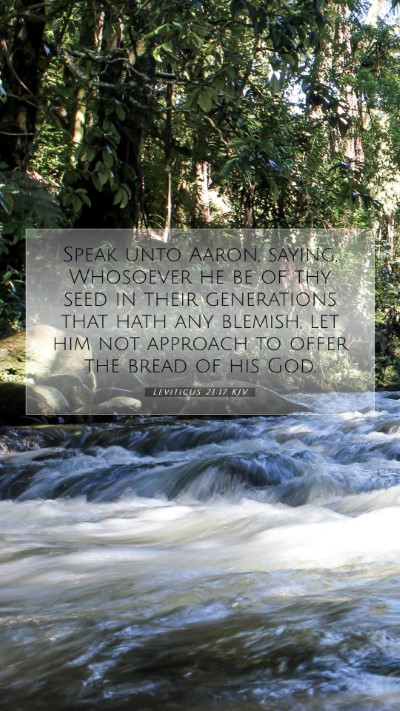Bible Verse Commentary: Leviticus 21:17
Leviticus 21:17 states, "Speak to Aaron, saying: None of your descendants in succeeding generations, who has any defect, may approach to offer the bread of his God." This verse carries a profound significance within the context of the priesthood and the holiness required of those who serve before God. Below is a comprehensive analysis combining insights from notable public domain commentaries such as those by Matthew Henry, Albert Barnes, and Adam Clarke.
Understanding the Context
The Book of Leviticus contains laws and regulations that guided the Israelites in their worship and day-to-day life. This specific verse is part of a larger section that details the qualifications for priests. God set high standards for those who approach Him, particularly in their role as mediators between Himself and the people.
Matthew Henry's Commentary
According to Matthew Henry, this regulation emphasizes that those who serve as priests must be without physical blemish, as they represent the holiness of God. The physical attributes symbolize the spiritual integrity required when approaching the divine. Henry highlights that these requirements serve as a reminder that God desires purity and holiness among His followers.
Albert Barnes' Commentary
Albert Barnes elaborates on the idea that this command would ensure that only the most qualified individuals would perform the sacred duties. He notes that while these restrictions may seem harsh, they reflect the larger principle of holiness that God expects from those who enter His service. Barnes also asserts that this standard was meant to underline the seriousness of worship and the reverence due to God.
Adam Clarke's Commentary
Adam Clarke adds that these laws were practical in ensuring that priests were healthy and thus able to perform their duties effectively. He links the idea of physical wholeness to spiritual wholeness, suggesting that the priest's state reflects the state of the worship located within Israel. Clarke's analysis reinforces the idea that the physical requirements were not merely about outward appearance but indicated an inner spiritual reality.
Spiritual Implications
From a spiritual perspective, the interpretation of Leviticus 21:17 reminds believers of the necessity for spiritual health and purity. Just as the priests were called to be blameless in appearance, Christians today are encouraged to seek inner purity as they approach God in worship and service.
Applications for Believers
This verse's significance extends beyond the ancient priests to all believers today. Here are some applications:
- Seeking Holiness: Believers are encouraged to strive for holiness in their own lives, reflecting God's character in all they do.
- Understanding Leadership: This verse can be seen as a guide for church leaders, underscoring the importance of moral integrity and spiritual soundness.
- Daily Worship: Just as the priests were to approach God with reverence, so too should believers cultivate a heart of worship in their daily lives.
Cross References
Leviticus 21:17 can be related to the following scriptures:
- Exodus 28:43: Discusses the garments of the priests, emphasizing their sacred role.
- 1 Peter 2:9: Reflects the idea of believers being a "royal priesthood," encouraging spiritual integrity.
- Hebrews 7:26: Describes the perfection of Christ as our high priest, who is beyond any physical imperfection.
Conclusion
Leviticus 21:17 serves as a powerful reminder of the importance of holiness and integrity in worship and service. Through the insights of prominent biblical commentators, we gain a fuller understanding of both the historical context and the lasting spiritual implications of this verse. As believers engage in Bible study, this verse invites deeper reflection on our own spiritual readiness to approach God.
Further Study Tools
To enhance understanding of Bible verses like Leviticus 21:17, consider utilizing various Bible study resources:
- Bible study guides for structured learning.
- Online Bible study platforms for community insights.
- Bible study courses to explore scripture academically.


